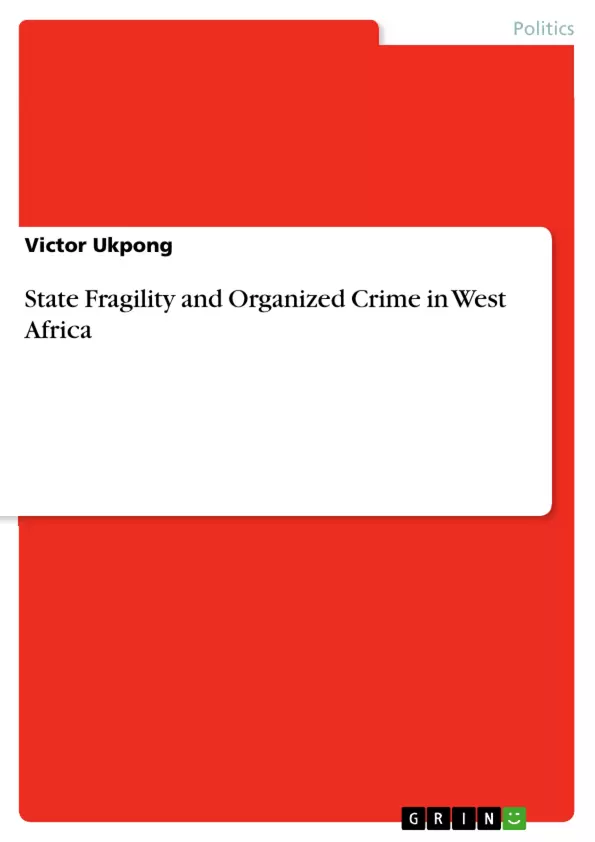West African states have become increasingly porous and vulnerable to the activities of organized criminal networks which negatively impact their security situations. At the same time, there are various national and bilateral concerns to tackle these problems and restore the security situation in these countries, yet they remain vulnerable to these quagmires, which are expressed in the forms of human trafficking/ smuggling, drug trafficking, armed robbery, money laundry and arms trafficking which have had tremendous effects on the security of these countries. However, the ease at which these crimes are executed across the sub-region signals the cooptation or involvement of some state officials, whose role is to pave way for the smooth execution of these of these nefarious acts for their private gains. In line with the foregoing, it has become necessary to interrogate the role of the criminal justice systems in the sub region.
This paper examines the dynamics of corruption and institutional lapses within the context of state fragility in West Africa and determines whether or not the sub-region does lack the capacity necessary to accurately respond to the methods utilized by trafficking networks in their businesses viewing from their proliferation in the sub-region despite their threats and efforts made to counter them. The research makrd use of secondary data and the data is derived from an in-depth review of related literature on the subject mainly from online journal articles.
The result of the findings shows that states’ failure to adequately position and manage their security apparatuses can give room for infiltrations that can entirely corrupt and defeat their entire security goal. Based on the findings of this work, it becomes evident that since West African states are deficient in this regard, their national security also been prone to such deficits.
Inhaltsverzeichnis (Table of Contents)
- ABSTRACT
- INTRODUCTION
- THE DYNAMICS OF STATE FRAGILITY AND TRANS-BORDER CRIMES IN WEST AFRICA
- STATE FRAGILITY AND ORGANIZED CRIMES IN WEST AFRICA
- INSTITUTIONAL DEFICIENCY
- CORRUPTION
- CONCLUSION
- REFERENCES
Zielsetzung und Themenschwerpunkte (Objectives and Key Themes)
This paper investigates the relationship between state fragility and organized crime in West Africa, specifically focusing on the impact of corruption and institutional lapses on the region's security situation. It aims to determine whether West African states lack the capacity to effectively respond to the proliferation of transnational criminal networks.
- State fragility and its impact on security
- The role of corruption and institutional deficiencies
- The prevalence of organized crime in West Africa
- The challenges faced by West African states in combating transnational crime
- The implications of state fragility for regional security and development
Zusammenfassung der Kapitel (Chapter Summaries)
- ABSTRACT: This chapter introduces the central argument of the paper, which explores the link between state fragility and organized crime in West Africa. It highlights the vulnerability of West African states to criminal activities and the challenges they face in combating them.
- INTRODUCTION: This chapter provides a contextual overview of the issues of state fragility and organized crime in West Africa. It discusses the factors contributing to state weakness, including corruption, poverty, and ineffective governance. The chapter also explores the motivations behind organized criminal networks targeting the region.
- THE DYNAMICS OF STATE FRAGILITY AND TRANS-BORDER CRIMES IN WEST AFRICA: This chapter delves into the dynamics of state fragility and its implications for the rise of organized crime in West Africa. It examines how weak governance, porous borders, and corruption create fertile ground for criminal activities. The chapter also discusses the challenges faced by state institutions in responding to these threats.
- STATE FRAGILITY AND ORGANIZED CRIMES IN WEST AFRICA: This chapter examines the specific factors contributing to state fragility in West Africa, particularly focusing on institutional deficiency and corruption. It analyzes the impact of these factors on the region's security situation and the ability of state institutions to combat organized crime.
Schlüsselwörter (Keywords)
This paper examines the interplay between state fragility, corruption, and organized crime in West Africa. It focuses on institutional deficiencies, transnational criminal networks, and the challenges faced by West African states in safeguarding security and development. The paper utilizes secondary data derived from an in-depth review of relevant literature, particularly online journal articles.
Frequently Asked Questions
How does state fragility contribute to organized crime in West Africa?
Fragile states often have weak security apparatuses and porous borders, creating a power vacuum that criminal networks exploit for activities like drug and human trafficking.
What is the role of corruption in West African criminal networks?
Corruption allows criminal networks to co-opt state officials, ensuring the smooth execution of illegal acts for private gain and undermining the justice system.
What are the most common trans-border crimes in the region?
Prevalent crimes include human trafficking, drug smuggling, armed robbery, money laundering, and the illegal arms trade.
Why do security efforts in West Africa often fail?
Failure is often due to institutional deficiencies, lack of capacity, and the infiltration of security agencies by criminal elements, which defeats overall security goals.
What are the implications of state failure for regional security?
State failure leads to increased vulnerability, making the entire sub-region a hub for international trafficking and hindering long-term economic and social development.
What was the methodology for this study?
The research utilized secondary data derived from an in-depth review of online journal articles and related literature on state fragility and institutional lapses.
- Citar trabajo
- Victor Ukpong (Autor), 2018, State Fragility and Organized Crime in West Africa, Múnich, GRIN Verlag, https://www.grin.com/document/429665



